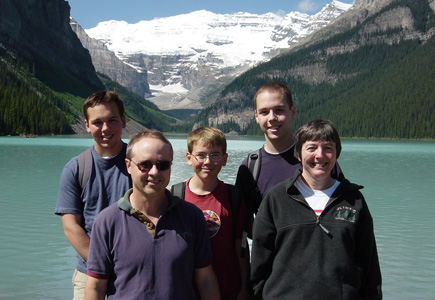
Jim Kasting
Evan Pugh Professor of Geosciences - Penn State University
I teach at Penn State. I was born in Schenectady, N.Y., and grew up in Huntsville, Ala. and Louisville, Ky.
I just happened to grow up near one of the big space centers in the U.S. I used to hear the Saturn V rocket being tested out at Marshall Spaceflight Center (MSFC) when I was living in Huntsville. Werner von Braun was the big man around town in those days.
This was back during the time when the U.S. space program was first getting started with the Mercury, Gemini and Apollo spacecraft. Many of the engines for these spacecraft were developed at Redstone Arsenal in Huntsville, so I think I knew from a very early age that I was interested in space, and I wanted to do something related to it.
I did a postdoc at NASA-Ames (ARC) after being invited out there to study long-term climate evolution on Venus, Earth, and Mars by Jim Pollack. After the postdoc, I stayed on there for another five years working on climate models.
I've been fortunate to learn from some very good scientists, such as My Ph.D. academic advisor at the University of Michigan, Tom Donahue. He was the planetary scientist who was very involved in the Pioneer Venus mission and also later in the Galileo mission to Jupiter. Jim Pollack, who I worked with at NASA-Ames, was Carl Sagn's first graduate student and a very well respected scientist. The other person who's been a real mentor to me is Dick Holland of Harvard. Dick Holland has worked for many years on questions such as the rise of oxygen in the Earth's atmosphere. I was also inspired by Jim Walker, who wrote a book on the evolution of the atmosphere more than 25 years ago.
I teach geoscience and planetary science courses at Penn State University.
I was very happy to be able to work out a theory for stellar habitable zones in 1993. The results of that paper are still being used to guide the search for habitable planets by Kepler, and hopefully in the future by other space-based telescopes.
Work hard as an undergraduate, and don't just restrict yourself to getting a technical background. Some of the courses that have been the most useful to me were English and speech, because if you're a successful scientist you'll find yourself giving talks. Also, if you're any kind of practicing scientist, you have to write up your research in research papers, and people will read those more if you write them well.
Swim, play tennis, run, and work out. I also enjoy watching a little sports on TV.
Planetary science is a global profession.

